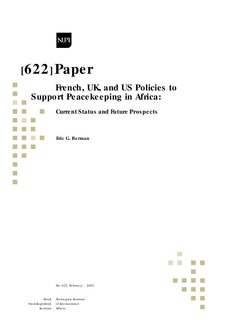| dc.description.abstract | In May 1997, France, the United Kingdom, and the United States announced their joint “P-3 Initiative”, to harmonize their peacekeeping capacity-building programs in Africa and foster an open dialogue between donors and recipients. The capacity-building programs of France, the UK and the US have since undergone numerous transformations. The centerpiece of French policy, the Renforcement des capacités Africaines de maintien de la paix (RECAMP) has had comparatively few changes to its basic structure, but has been scaled down. The UK African Peacekeeping Training Support Programme has given way to a much larger and more ambitious initiative. The US African Crisis Response Initiative (ACRI) has evolved significantly and will undergo a more fundamental change in 2002, including shedding its name. Moreover, Washington initiated a new capacity-building policy in 2001, which dwarfed ACRI in terms of resources and introduced the provision of lethal equipment. In November 2001, the “P-3” met in London to assess their programs. They could take satisfaction that progress had been made on a number of levels. Much more importantly, however, the three partners have created little in the way of synergy. A question that cuts to the core of the capacitybuilding programs is: Does the training or equipment offered make African recipients any more willing or able to undertake peacekeeping on their continent? The answer is far from clear. As for the enhanced capacity, much of what is being offered is of questionable value. To some extent, France, the UK, and the US have acknowledged some of their own programs’ limitations, and they are attempting to redress these weaknesses. Government officials are now much more receptive to criticism and suggestions for change. | nb_NO |

